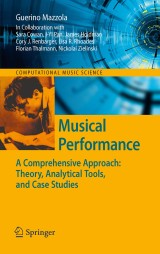Details

Musical Performance
A Comprehensive Approach: Theory, Analytical Tools, and Case StudiesComputational Music Science
|
96,29 € |
|
| Verlag: | Springer |
| Format: | |
| Veröffentl.: | 16.11.2010 |
| ISBN/EAN: | 9783642118388 |
| Sprache: | englisch |
| Anzahl Seiten: | 290 |
Dieses eBook enthält ein Wasserzeichen.
Beschreibungen
<p>This book is a first sketch of what the overall field of performance could look like as a modern <i>scientific field</i> but not its stylistically differentiated practice, pedagogy, and history. Musical performance is the most complex field of music. It comprises the study of a composition’s expression in terms of analysis, emotion, and gesture, and then its transformation into embodied reality, turning formulaic facts into dramatic movements of human cognition. Combining these components in a creative way is a sophisticated mix of knowledge and mastery, which more resembles the cooking of a delicate recipe than a rational procedure. </p><p> </p><p>This book is the first one aiming at such comprehensive coverage of the topic, and it does so also as a university text book. We include musicological and philosophical aspects as well as empirical performance research. Presenting analytical tools and case studies turns this project into a demanding enterprise in construction and experimental setups of performances, especially those generated by the music software Rubato. </p><p> </p><p>We are happy that this book was written following a course for performance students at the School of Music of the University of Minnesota. Their education should not be restricted to the canonical practice. They must know the rationale for their performance. It is not sufficient to learn performance with the old-fashioned imitation model of the teacher's antetype, this cannot be an exclusive tool since it dramatically lacks the poetical precision asked for by Adorno's and Benjamin's micrologic. Without such alternatives to intuitive imitation, performance risks being disconnected from the audience. </p><p> </p><p> </p>
<p>Part I Introduction.- 1 Introduction and Overview.- 2 List of Symbols.- 3 Short History of Performance Theory.- 4 Oniontology.- Part II Structure Theory.- 5 What Is Structure Theory?- 6 Tempo Curves.- 7 Tuning, Intonation, and Dynamics.- 8 Combining Tempo, Tuning, and Dynamics.- 9 Articulation.- 10 General Performance Fields.- 11 The Category of Performance Cells and Hierarchies .- Part III Expressive Theory.- 12 What Is Expressive Theory?- 13 Emotional Expression.- 14 Gestural Expression.- 15 Analytical Expression.- 16 Analytical Weights.- 17 Shaping Operators.- 18 Two Generic Models and the Challenge of Improvisation.- 19 String Quartet Theory .- Part IV Rubato: Model and Software.- 20 Performance Scores.- 21 Stemma Theory.- 22 Case Studies.- 23 Statistics.- Part V Inverse Performance.- 24 What Is Inverse Performance Theory?- 25 The Technical Setup.- 26 Schumann's Träumerei: Argerich vs. Horowitz.- 27 Rethinking Music Critique.- Part VI Epilogue.- 28 Summary of Performance Theory.- 29 Future Developments.- Part VII Bibliographic References, Music Examples, and Index.- References<br>Bibliography.- Music Examples.</p>
<p>This book is a first sketch of what the overall field of performance could look like as a modern <i>scientific field</i> but not its stylistically differentiated practice, pedagogy, and history. Musical performance is the most complex field of music. It comprises the study of a composition’s expression in terms of analysis, emotion, and gesture, and then its transformation into embodied reality, turning formulaic facts into dramatic movements of human cognition. Combining these components in a creative way is a sophisticated mix of knowledge and mastery, which more resembles the cooking of a delicate recipe than a rational procedure. </p><p> This book is the first one aiming at such comprehensive coverage of the topic, and it does so also as a university text book. We include musicological and philosophical aspects as well as empirical performance research. Presenting analytical tools and case studies turns this project into a demanding enterprise in construction and experimental setups of performances, especially those generated by the music software Rubato. </p><p> We are happy that this book was written following a course for performance students at the School of Music of the University of Minnesota. Their education should not be restricted to the canonical practice. They must know the rationale for their performance. It is not sufficient to learn performance with the old-fashioned imitation model of the teacher's antetype, this cannot be an exclusive tool since it dramatically lacks the poetical precision asked for by Adorno's and Benjamin's micrologic. Without such alternatives to intuitive imitation, performance risks being disconnected from the audience. </p><p> </p><p> </p>
First book that gives full account on the state of the art of empirical and philosophical performance theory, including software and case studies Is a textbook for music students and researchers as well with rich illustrations and sound examples Has been written by one of the leading experts in the field Includes supplementary material: sn.pub/extras
Diese Produkte könnten Sie auch interessieren:

Mixed-Signal Layout Generation Concepts

von: Chieh Lin, Arthur H.M. van Roermund, Domine Leenaerts

96,29 €

System-Level Design Techniques for Energy-Efficient Embedded Systems

von: Marcus T. Schmitz, Bashir M. Al-Hashimi, Petru Eles

96,29 €














